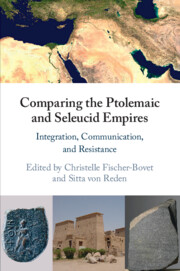Book contents
- Comparing the Ptolemaic and Seleucid Empires
- Comparing the Ptolemaic and Seleucid Empires
- Copyright page
- Contents
- Contributors
- Preface
- Note on Abbreviations
- Maps
- Introduction
- Part I Cities, Settlement and Integration
- Chapter 1 Imperial metropoleis and Foundation Myths
- Chapter 2 Reassessing Hellenistic Settlement Policies
- Chapter 3 The Integration of Indigenous Elites and the Development of poleis in the Ptolemaic and Seleucid Empires
- Chapter 4 Contextualizing a Ptolemaic Solution
- Part II Communication and Exchange
- Part III Collaboration, Crisis, and Resistance
- Bibliography
- Index
Chapter 2 - Reassessing Hellenistic Settlement Policies
The Seleucid Far East, Ptolemaic Red Sea Basin and Egypt
from Part I - Cities, Settlement and Integration
Published online by Cambridge University Press: 17 September 2021
- Comparing the Ptolemaic and Seleucid Empires
- Comparing the Ptolemaic and Seleucid Empires
- Copyright page
- Contents
- Contributors
- Preface
- Note on Abbreviations
- Maps
- Introduction
- Part I Cities, Settlement and Integration
- Chapter 1 Imperial metropoleis and Foundation Myths
- Chapter 2 Reassessing Hellenistic Settlement Policies
- Chapter 3 The Integration of Indigenous Elites and the Development of poleis in the Ptolemaic and Seleucid Empires
- Chapter 4 Contextualizing a Ptolemaic Solution
- Part II Communication and Exchange
- Part III Collaboration, Crisis, and Resistance
- Bibliography
- Index
Summary
This chapter explores the foundation of poleis beyond the capital cities, as well as the alteration and renaming of settlements as marks of imperialism. Rather than presenting an exhaustive survey, the authors emphasize the methodological issues faced by historians of identifying and assessing new settlements – Mairs by focusing on the historiography and archaeology of the early Seleucid Far East, and Fischer-Bovet by offering a typology of Ptolemaic settlements. Seleucid settlements in Bactria can only be understood as a continuation of Alexander’s settlement policy. Their strong military character shows the early Seleucid interest in Central Asia and is not representative of the empire as a whole. The Ptolemaic empire was also connected through a network of either new or transformed settlements, whose variety was adapted to each region and actively shaped by local populations. The existing urban and administrative networks, moreover, did not create the need for new poleis – and complementary explanation to the question raised by Clancier and Gorre in the same volume – but the new and altered settlements reflect the Ptolemaic strategy of combining Greek and Egyptian elements.
- Type
- Chapter
- Information
- Comparing the Ptolemaic and Seleucid EmpiresIntegration, Communication, and Resistance, pp. 48 - 85Publisher: Cambridge University PressPrint publication year: 2021
- 14
- Cited by



